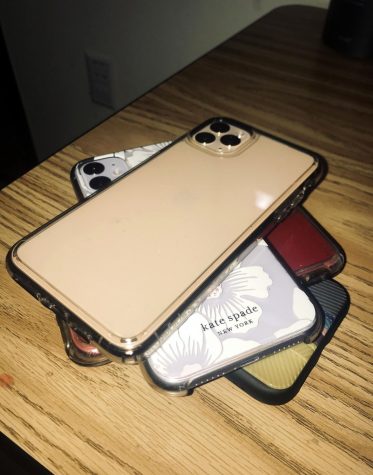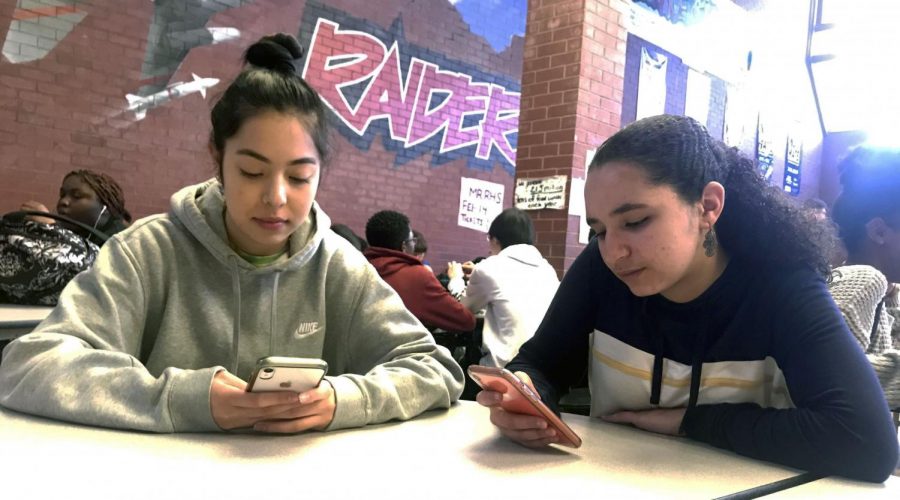Opinion: Let’s Be More Conscious of Our Technology Use
Feature Photo by: Melanie Aguirre – Denise Arreola (left) and Marwa Ait Chafhi (right) spend lunch together as they go through their social media.
February 19, 2020
It’s the 21st century and the most prevalent form of communication these days is through the means of technology more specifically – and even less surprisingly – cell phones. Yet when I think about my childhood and those around me it blows my mind that in a matter of about fifteen years technology has grown to be such an unintentionally essential part of people’s lives.
It makes me disappointed to see a large portion of people’s time being drained by technology and social media, but there is another part of me who feels so proud of society for excelling in certain areas because of it. It’s quite the conundrum; technology can come with negative effects but it still holds the possibility for greatness if we are conscientious of how we use it in education, healthcare, and the discovery of many mysteries that we have yet to uncover.
I was born in Guatemala, which is not as advanced of a country as the U.S. For this reason I was not exposed to any form of technology for the first few years of my life. Once I began living in the United States, I don’t remember there being many digital devices around; I entertained myself playing outside with toys, and best of all, my vivid imagination. I read, wrote, and built a lot, but I would always find something to do that did not involve technology.
Looking back, I wouldn’t change anything and I’m glad that technology wasn’t there to fill every moment of spare time that I had, or answer every question that I thought of. The questions that crowd your mind as a child lead you to new curiosities, more questions, and influence creativity.
According to Dr. KH Kim a Professor of Creativity & Innovation at the College of William & Mary, the constant use of technology in ways that do not exercise our minds or make us think “stifles natural curiosities, the joy of learning, and exploring topics that might lead to their passions.”
“My childhood was better without technology because I was able to experience and gain a lot of ‘survival skills’ and life hacks which I learned through my neighborhood friends that people nowadays would have to look up on the internet like, changing a bike tire or how to play games like hopscotch and double dutch,” described former Rangeview High School student, Kimberly Iraheta.
Because Iraheta was born in 2000, it was a lot easier for her to stay away from technology, social media, and cell phones because they had not emerged with such advanced versions of them. However she did highlight that with technology becoming a more innovative industry we have been able to make advances like the discovery of new stars, the use of MRI’s, and the creation of Duolingo, among others. However, it is important to notice that all of these things do not come from the typical everyday forms of technology.
“As a child, I should have been playing and interacting with people more instead of watching TV, I think that’s why I tend to use my phone in public places because I never practiced social skills as a child,”said junior Priscilla Tampubolon in contrast.
Many of us have memories of TV shows and video games that were part of our childhood, however in the future the children today remember those things as well as cell phones, tablets, computers, and social media being a part of nearly everything they did. For many generations before 2005, watching TV or using a device were a last resort, in contrast for kids in the years following the rise and use of technology were one of the first things they knew of, such as the introduction of Twitter, and the iPhone.
There are people trying to connect with their families who live far away and without technology it would be very difficult, but ‘easy’ is not the point we should be at. With the overuse of technology people have become used to the idea of instant gratification, we expect something that should be awkward, uncomfortable, and sometimes difficult like communicating to be ‘easy’. As a result people resort to using emojis to communicate, and begin to text people who are nearer and nearer until they are texting people who are right next to them instead of talking to them.
Salma Ait-Chafhi explained, “I am completely oblivious to how much I use my phone. I do wish I used it less. Honestly, I think I have somewhat of an addiction especially with social media. A lot of my friends have done social media cleanses and every time I’ve tried I’ve failed.”
It is quite daunting to know that sometimes we might not even realize that we look at our phones as much as we do; it has become an impulse. So that is what we have to change.

To inhibit change we must first start with the issue. The habits that we build can become so hard to break but if we build new habits of setting app limits on our phones, or turning off our notifications, etc. it would eventually become easier to not pointlessly use our phones during spare time.
The advantages that have come with technology are undoubtedly exceptional and the world would not have been able to achieve many of the things that it has without the innovation of technology. People are now able to talk to each other despite being halfway around the world, corporations and businesses have grown in speed and quality, and advancements have been made in medicine and healthcare that have saved many lives. All of this advancement has not been through cell phones or technology that people use daily, these advancements and discoveries have been made with technology formulated specifically for those uses.
Things are what you make of them. In this case, technology will give you what you put into it. “Smartphones have provided us with a virtually unlimited supply of social stimuli, both positive and negative. Every notification, whether it’s a text message, a “like” on Instagram, or a Facebook notification, has the potential to be a positive social stimulus and dopamine influx.”
We might never stop using technology and that is not the goal; the goal should be to use technology to its fullest potential for greatness by being more aware of what we are accomplishing when we use it. If we don’t, it would be like having a Ferrari but never driving it, or buying a highly recommended book and never reading it.
While Ait Chafhi’s average screen time on her cell phone was about 5 hours a day, Tampubolon’s ranged from 8 to 10 hours a day. Both girls emphasized that they believed they use their phones much more than they need to.
As Tampubolon said, “I think that we shouldn’t learn to limit [technology] instead we should learn to utilize it in a more efficient way.” In reality it isn’t about using technology ‘too much’ or ‘too little’, but when neither Tampubolon or Ait Chafhi them felt like their time was always being efficiently used when on their phones it clear that they can eliminate all of the excess using of their phones and apply it to an area where they actually feel satisfied with the usage of their time.
So whenever people feel the need to look at their phones, watch TV, or use other forms of technology they should take the time to notice that they are about to engage in the use of that device. It’s the little details like this one that make such a difference when trying to make meaning of all of the things we do in life.












